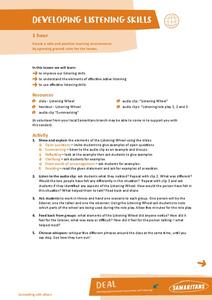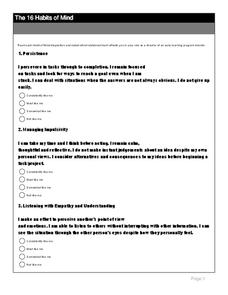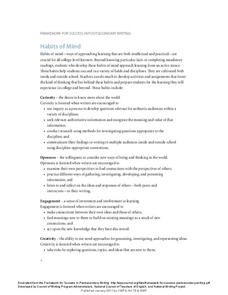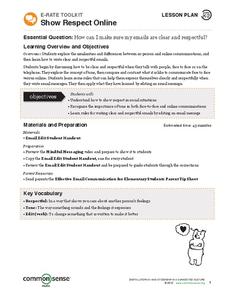Teach Engineering
Get the Word Out at McDonald's!
To get the word out that the Great Pacific garbage patch (GPGP) contains millions of pounds of non-biodegrading plastics, individuals research the GPGP and write an article for a newsletter. Researchers present their facts in a way that...
Code.org
Sending Binary Messages with the Internet Simulator
Show your class how to develop a protocol to solve a problem. Pupils then continue with working with binary messages but refine a protocol to assist with the distinction of individual bits by including a bit rate. Finally, the pairs use...
National Association for the Education of Young Children
Ten Tips for Involving Families through Internet-Based Communication
Communication is key for a successful parent-teacher relationship, but communication can be difficult when there are thirty-plus families involved. Make your life easier with online communication and an article that details 10 tips to...
Computer Science Unplugged
Tablets of Stone—Network Communication Protocols
Show your learners that the game of Telephone isn't the only way messages get mixed up. Pairs transform into the sender and receiver of a message sent in packets. At least one pupil is the messenger who either delivers, delays, or fails...
Cru High School
Games / Icebreakers
Twenty-three, fun-filled activities make up a list of icebreakers designed to familiarize class members with one another, and add a sense of community to the classroom.
Project B.A.S.I.C. Child Development Specialist and Child Care Consultation
Better Attitudes and Skills in Children
Little kids often have very big feelings, and need help expressing them. A set of social emotional lessons provide tangible ways for young elementary learners to visualize their emotions, focus on clear communication, and channel their...
John Wiley & Sons
Games, Role Plays, and Exercises
Whether you're lost at sea, lost in the woods, or testing communication skills, teamwork is always important. Build your middle and high schoolers' cooperative and collaborative skills with four activities that prompts groups to compete...
Council for the Curriculum, Examinations and Assessment
Self Concept
Reflect on your identity, the past events that helped you form your personality, and your future aspirations with a lesson about self concept. Eighth graders examine their own traits and the ways they are unique from their peers before...
Council for the Curriculum, Examinations and Assessment
Feelings and Emotions
Eighth graders express their emotions with a set of activities about self reflection and feelings. With a set of emotion cards and a worksheet that details negative thought patterns, the resource empowers young learners to discover and...
Council for the Curriculum, Examinations and Assessment
Health and the Whole Person
Health is more than measuring your blood pressure and eating nutritious foods. Eighth graders discuss the factors that play into an individual's health, including spirituality, social life and friendships, emotional stability, cognitive...
Conflict Resolution Network
Empathy
Children are naturally friendly and communicative, but often have a hard time expressing their emotions in a clear and understandable way. Help them hone their communication skills with a set of activities based on creating empathy,...
Samaritans
Developing Listening Skills
Being a good listener is key to building and maintaining positive relationships. Use this lesson as a way to help children connect with others by becoming active listeners and improving their listening skills.
Middle Tennessee State University
The Invention of the Telephone
All of the people in your class would agree that life would be different without the invention of the telephone! Study Alexander Graham Bell's most famous and influential invention through the primary source document of his sketch of the...
Museum of Disability
Taking Visual Impairment to School
What is the world like when you can't see, or when your vision is impaired? Learn about how Lisa communicates with the world around her with Taking Visual Impairment to School by Rita Whitman Steingold. Learners answer discussion...
Museum of Disability
Can You Hear a Rainbow?
Teach your class about compassion and empathy with Jamee Riggio Heelan's Can You Hear a Rainbow? As kids read about Chris, a boy who is deaf, they discuss the things he likes to do, as well as the ways he communicates with the world.
profitt.gatech.edu
Effective Communication: Listening, Speaking, Writing, Interpreting
Help young learners become active listeners and strong public speakers with a set of activities that range from paraphrasing, to discussions, and self-reflection. Additionally, the lessons address social media skills and non-verbal...
Center School
The 16 Habits of Mind
Which of Costa's 16 Habit of Mind best describes you? Take a short assessment to see which quality is most consistently like you, or which quality is not like you at all.
Oregon Department of Education
Habits of Mind
There is more than one way to approach a problem. Explore the habits of mind as they relate to the methods of approaching learning, and to how young writers can develop success once they learn to foster each skill.
Curated OER
The 16 Habits of Mind
Study the 16 Habits of Mind with a professional resource. Based on Describing 16 Habits of Mind by Arthur L. Costa and Bena Kallick, the resource details 16 ways learners perceive problems around them and produce ways to deal with those...
King Country
Lesson 11: Communication - Day 4: Hearing "NO"
"No!" Accepting a "No" response and handling rejection appropriately can be a challenge. After reviewing the previous lesson on asking for what they want, class members role-play appropriate ways of responding when their request has been...
King Country
Lesson 10: Communication - Day 3: Asking for What You Want
High schoolers practice appropriate verbal and non-verbal methods of asking for what they want in a lesson designed for the special education classroom.
King Country
Lesson 9: Communication - Day 2: Assertiveness
Appropriate assertive and non-verbal assertive communication is the focus of this lesson plan designed for the special education classroom. Using mirrors, class members practice assertive responses to a variety of situations.
Common Sense Media
Show Respect Online
Through discussion and a variety of worksheet types, pupils learn to review their e-mails for grammar, appropriateness, and respect before sending.
Danya International, Inc.
Life Journey through Autism: An Educator’s Guide to Asperger Syndrome
Whether this the first time you've had a learner with Asperger Syndrome in your class, or you have years of experience with learners on the autism spectrum, a booklet about the best ways to accommodate these kids in the classroom could...

























